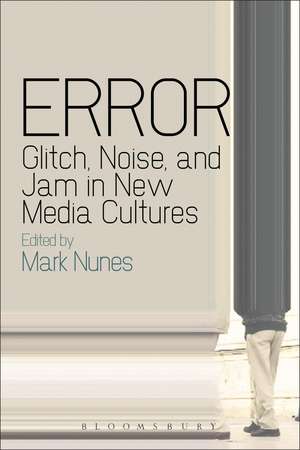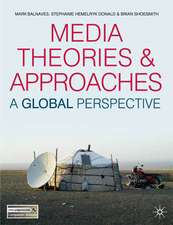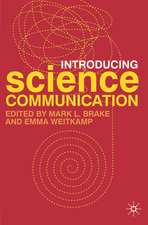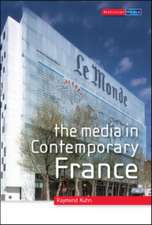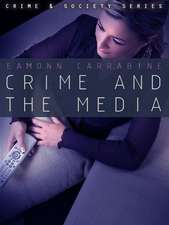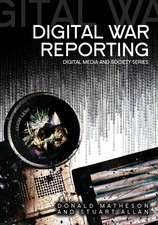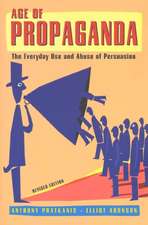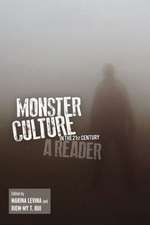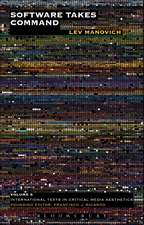Error: Glitch, Noise, and Jam in New Media Cultures
Editat de PhD Mark Nunesen Limba Engleză Paperback – 25 iul 2012
Preț: 374.66 lei
Preț vechi: 517.89 lei
-28% Nou
Puncte Express: 562
Preț estimativ în valută:
71.70€ • 74.58$ • 59.19£
71.70€ • 74.58$ • 59.19£
Carte tipărită la comandă
Livrare economică 15-29 aprilie
Preluare comenzi: 021 569.72.76
Specificații
ISBN-13: 9781441110213
ISBN-10: 1441110216
Pagini: 288
Ilustrații: 10
Dimensiuni: 152 x 229 x 15 mm
Greutate: 0.38 kg
Editura: Bloomsbury Publishing
Colecția Continuum
Locul publicării:New York, United States
ISBN-10: 1441110216
Pagini: 288
Ilustrații: 10
Dimensiuni: 152 x 229 x 15 mm
Greutate: 0.38 kg
Editura: Bloomsbury Publishing
Colecția Continuum
Locul publicării:New York, United States
Caracteristici
A growing number of programs in the United States, United Kingdom and Australia are now formalizing the study of "new media" as cultural phenomena.
Notă biografică
Mark Nunes is Chair of the Department of English, Technical Communication, and Media Arts at Southern Polytechnic State University. He is the author of Cyberspaces of Everyday Life (University of Minnesota Press, 2006). He is also author of several articles on networked social space, including "Ephemeral Cities: Postmodern Urbanism and the Production of Online Space" in Virtual Globalizations (Routledge, 2001) and "Baudrillard in Cyberspace: Internet, Virtuality, and Postmodernity" in Style (1995).
Cuprins
INTRODUCTIONError, Noise and Potential: The Outside of PurposeMark Nunes, Southern Polytechnic State UniversityHACK1. Revealing ErrorsBenjamin Mako Hill, Massachusetts Institute of Technology2. Aesthetics of the Error: Media Art, the Machine, the Unforeseen and the Errant Tim Barker, University of New South Wales3. Information, Noise, et al. Susan Ballard, Dunedin School of Art4. Add-Art and Your Neighbors' Biz: A Tactical Manipulation of Noise xtine burrough, California State University, Fullerton5. Stock Images, Filler Content, Semantic Ambiguity Christopher Grant WardGAME6. Gaming the Glitch: Room for Error Peter Krapp, University of California, Irvine7. The Seven Million Dollar PowerPoint and Its Aftermath: What Happens When the House Intelligence Committee Sees "Terrorist Use of the Internet" in a Battlefield 2 Fan Film Elizabeth Losh, University of California, Irvine8. Disrupting the Public Sphere: Mediated Noise and Oppositional Politics Ted Gournelos, Rollins College9. Wikipedia, Error, and Fear of the Bad Actor Mark Nunes, Southern Polytechnic State UniversityJAM10. Contingent Operations: Reticular Aesthetics, Transduction, and the EKMRZ TrilogyMichael Dieter, University of Melbourne11. Queer/Error: Gay Media Systems and Processes of AbjectionChad Parkhill, University of QueenslandJessica Rodgers, Queensland University of Technology12. Error-Contagion: Network Hypnosis and Collective CulpabilityTony D. Sampson, University of East London13. Error 1337Stuart Moulthrop, University of BaltimoreABOUT THE CONTRIBUTORS
Recenzii
If you have had enough of the logic of maximum performance, organized by process management and promoting maximum predictability and minimum error, this brilliant collection of essays is the book for you. Doubling the history of control through a genealogy of error, this collection maps the possibility of asystematic resistance in cybernetic networks, challenging the reader to imagine the liberating potential of going astray. Giving in to the pull of the unintended and the unforeseen, the glitch aesthetic of jams and hacks, errors and noise outlined in this book provides a possible model of flight from the terror of efficiency that haunts network societies. -- Tiziana Terranova, associate professor in the Sociology of Communications at the Dipartimento di Studi Americani, Culturali e Linguistici, Università degli Studi di Napoli 'L'Orientale'
Author quoted in article on designing failure in Computer Arts.
Author quoted in article on designing failure in Computer Arts.
